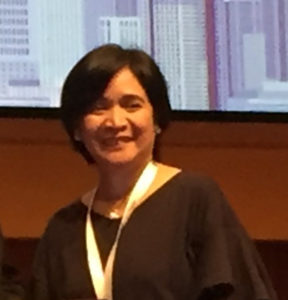
The cargo transport and logistics industry is not an exclusively male field, but an area where women can excel as well, according to Philippine International Seafreight Forwarder Association, Inc. (PISFA) president Doris Torres.
“I urge you young women professionals to believe in yourselves. Believe you have a place in the transport and logistics field, as this is one of the most dynamic industries where you can harness your full potential,” Torres said in a speech entitled “Capitalizing Women’s Natural Strength in the Transport Industry” during the recent International Federation of Freight Forwarders Association World Congress 2017 in Kuala Lumpur, Malaysia.
Torres, the third woman to be elected president of PISFA, stressed that the role of women around the world has been evolving, with women today being elected as leaders in their fields of work or activity and doing things formerly assigned only to men.
This, she noted, shows that women are capable of taking top and critical positions in any field, including cargo transportation and logistics. She pointed out, however, that the industry is not just about moving, lifting, and delivering cargo from points A to B, but is also about planning, implementing, coordinating, monitoring, and interfacing various processes to ensure the smooth execution of the entire operation.
Beyond delivery
She added that the job does not end with a successful product delivery either.
“The task does not stop there; it extends to the continuous review of processes and costs, adoption of new strategies, and use of innovations for future operations,” she said.
“Logistics specialists should bring along vision, logical, analytical and conceptual intelligence, and the talent to coordinate and organize. Furthermore, they should have communicative and teamworking capability,” said Torres of the traits desired of logistics players, citing Klaus-Michael Kuehne, the honorary chairman of international transport company Kuehne+Nagel.
These special qualities “and the natural strengths of a woman” are essential to succeed in the complex world of transport and logistics, she pointed out.
Citing her own previous experience as operations manager, Torres noted that women “do not have to act like men in order to become part of the game in logistics” otherwise, “the benefit of diversity in the workplace will not be realized.”
Instead, women should “capitalize on [the] natural strengths [of their gender] and contribute to the advancement of the transport and logistics industry,” she continued.
Diversity
She recalled that the project she was involved in as operations manager required the transport, delivery, rigging, and installation of equipment and accessories for a 105-megawatt (MW) and a 108-MW power plant located in two different sites in the Philippines. The project’s end-user was Filipino, but the contractor was American, the hauler British, the man in charge of rigging and installation Dutch, and the manufacturer Finnish. In addition, sea transport was done by a Danish vessel, logistics was performed by a German national, and the local logistics agent was the Swiss-Filipino company Torres was working for.
In such a project marked by racial diversity, Torres observed she was only one of two women working on the project, the other a German logistics representative who was coordinating and organizing every stage of field work.
As operations manager, Torres was assigned to organize, coordinate, and put in place the requirements of those in the field to make sure they perform their job and to avoid possible disruptions and delays.
While each had their own expertise, Torres noted that “if the different activities were not well-coordinated, well-organized and planned, I do believe the task would not have been a success.”
“I did not have to put on safety shoes, or a vest or a hardhat. I was behind the scenes, carefully planning, organizing, coordinating, networking, and communicating. These roles did not make a woman like
me a less or inferior [member of the team]. On the contrary, these are great contributions to the team, and women do not even have to try hard, as the qualities needed for the tasks are innate to them,” she narrated.
Torres emphasized that in any industry, “the bottom line is for a team to meet the goals.”
“Bottom line does not discriminate gender. This of course is [easier said than done]. A logistics leader should be able to strike a good balance and [create] synergies [from] all the qualities needed in the
performance of work, in order to optimize and to effectively perform the job. These qualities and skills [can be possessed by either] a man or a woman,” she said. – Roumina Pablo
